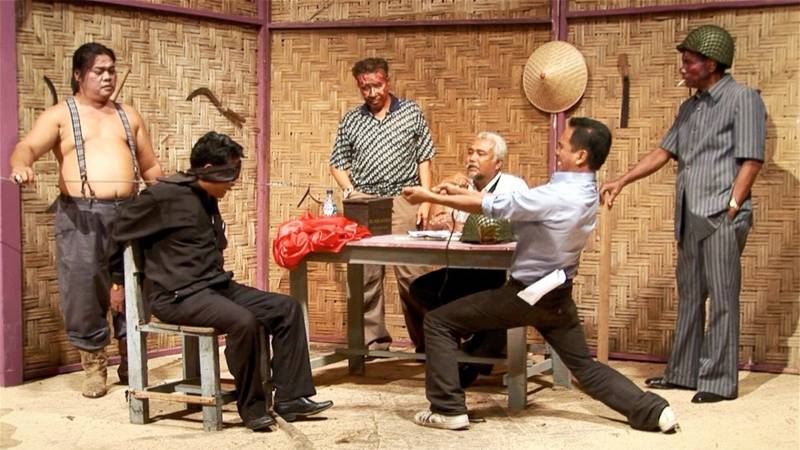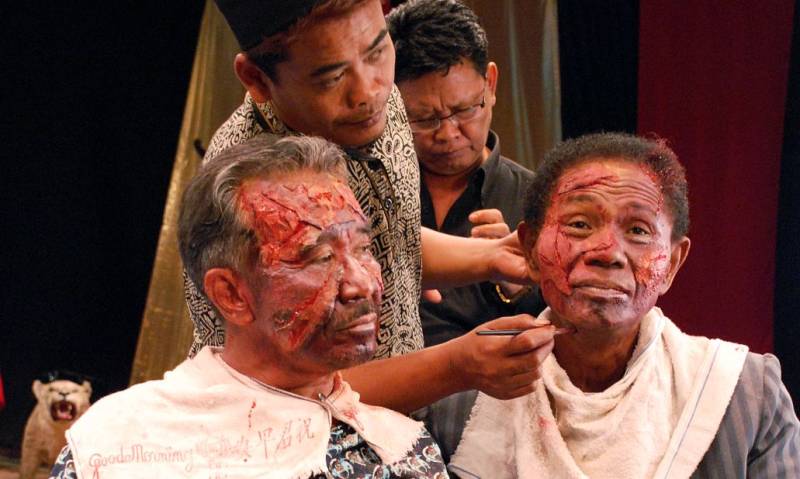
When I watched The Zone of Interest, nominated as it is for five Oscars, after the last scene in which Rudolf Höss suddenly has a vomiting attack, I decided that I had to watch The Act of Killing again – because both films end in the same way. Anwar Congo, one of the heroes of Joshua Oppenheimer's documentary, also suffers from sudden convulsions in the finale of the film.
While throughout the The Act of Killing, Anwar Congo was proud of himself and what he was doing, something broke inside him when he played a tortured communist. But he still didn't admit it. Only at the very end did he lose all pride in his actions. And at this point, his body – since his mind was still in denial – gave vent to his emotions and remorse.
Released in 2012, Oppenheimer's film tells the story of the anti-communist genocide in Indonesia, during which nearly two million members of the Communist Party of Indonesia (PKI) and others were killed during 1965-66. The strength of this film lies in the fact that it presents conversations with people who personally committed these massacres. However, this does not come in the form of an interrogation of elderly, embarrassed retirees, as is often the case with documentaries about the Holocaust. In this case, we are dealing with a proud and detailed account of people who are still among Indonesia's political and business elites.
As reported by Jess Melvin: ”The concept of The Act of Killing was born out of Oppenheimer’s frustrations while filming The Globalization Tapes in North Sumatra’s plantation belt in 2002, where he became aware that contemporary exploitation of plantation workers was intimately tied to the massacre of plantation worker union members in 1965 […]”

Oppenheimer was shocked to realise that perpetrators of the 1965-66 mass killings were indeed happy and even proud to speak about their involvement, boasting about what they claimed to have done. As Oppenheimer began to interview perpetrators for this new project, he has explained that he began to became aware that the story he was telling was not the story of “what happened in 1965” per se, but rather the story of what was happening in the present such that these men felt so “comfortable boasting about their crimes […]”
To gain the protagonists’ trust, Oppenheimer has explained, he simply approached them in “the same way as you would gain any human being’s trust,” by treating them with “kindness, openness, and listening to their stories.” “You must remember,” Oppenheimer continues, “there was nothing for them to be suspicious of. They didn’t feel like they had done anything that needed to be kept hidden. On the contrary, they felt their deeds were worthy of celebration.”
Released in 2012, Oppenheimer's film tells the story of the anti-communist genocide in Indonesia, during which nearly two million members of the Communist Party of Indonesia (PKI) and others were killed during 1965-66. The strength of this film lies in the fact that it presents conversations with people who personally committed these massacres
And indeed, the perpetrators feel no remorse. In one of the final scenes, while watching footage shot for the film, Anwar Congo says: ”This is great. I never imagined I could make something so great. One thing that makes me so proud…” And yet he has just made a film about his crimes!
Another of the characters, Safit Pardede, at one point tells the director if he would appear before a tribunal at The Hague: ”'War crimes' are defined by the winners. I'm a winner. So I can make my own definition. And more important, not everything true is good. Some truths are not good. Like re-opening this case […] I'd go [to Hague]! I don't feel guilty, so why would I go? Because I'd be famous. I'm ready!”
Jusuf Kalla, two-time Vice President of Indonesia, shown in one of the scenes of this documentary, speaks directly about the paramilitary group Pemuda Pancasila (Pancasila Youth), which was responsible for these massacres: ”The spirit of Pancasila Youth, that some people accuse of being gangsters. Gangsters are people who work outside of the system, not for the government. The word gangster (‘preman’ in Bahasa Indonesia) comes from ‘free men.’ This nation needs ‘free men.’ If everyone worked for the government, we’d be a nation of bureaucrats. We’d get nothing done. We need gangsters to get things done. Free, private men, who get things done. We need gangsters, who are willing to take risks in business. Use your muscles! Muscles aren’t for beating up people. Although beating people up is sometimes needed.” The entire speech took place amid laughter and shouts from the Pemuda Pancasila members gathered in the hall.
These comments show another important issue: precisely how the far right does its ‘dirty work.’ And so, the Indonesian mass killer resorts to that policy that is the domain of the right-wing, ie privatisation - in this case, of violence.
In fact, this is not unique to Indonesia's situation. if we look at other countries such as Latin America, particularly the Contras in Nicaragua, we see that the right-wing is even able to privatise and individualise systemic violence, outsourcing it to militias and death squads. This is supposed to be an expression of fascist respect for freedom, or as Jusuf Kalla said, "free men." And yet this is just rhetoric, because they literally become tools of the ruling classes, ambitious petty criminals hired to do dirty work for the army and the bourgeoisie. Of course, just like the heroes of The Act of Killing, they can be rewarded for their role over time and get passes to enter elite salons.
Even though the film's characters are proud of their crimes and believe that the film will bring them fame as ‘national heroes,’ there are moments when they doubt it. One of them says: ”Everything Anwar and I have always said is false. It's not the communists who were cruel. I'm absolutely aware that we were cruel." They are afraid that the world will know the truth while feeling proud of their actions.
And this is perhaps the most important political lesson of The Act of Killing. In the collective consciousness, communists are portrayed as ‘cruel dictators and sadistic murderers worse than Hitler.’ Meanwhile, this film shows that the historical truth has been quite different: communists used violence when forced to do so in response to the violence of the bourgeoisie.
And this too, although not directly, is shown in one of the scenes. During the staging of a communist's interrogation, the words are spoken: "We give them to the farmers. We give them fertiliser, seeds, farming equipment[...] Indeed, we want to show that the Communist party are the best party."
The only crime of the Indonesian communists was the desire to take land from the landowners and give it to the masses – and for this they paid with their own complete destruction.

